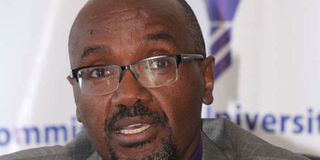Experts set to meet over varsities’ woes

Commission for University Education chief executive officer Mwenda Ntarangwi. More than 300 experts in university education are expected to meet Tuesday to discuss crises afflicting higher education. PHOTO | FILE | NATION MEDIA GROUP
What you need to know:
- Data from the government indicates that 16 of the 31 public universities cannot afford to pay their staff salaries.
- Other issues include quality of courses offered at the institutions, which are said to be irrelevant and a route to minting money.
- An analysis by the Kenya Universities and Colleges Central Placement Service revealed that some courses did not attract any students.
More than 300 experts in university education are expected to meet Tuesday to discuss crises afflicting higher education.
The three-day conference will take place at the Kenya School of Monetary Studies in Nairobi under the theme: “Positioning universities as the nexus of research, innovation and technology transfer for socioeconomic transformation.”
Commission for University Education (CUE) Chief Executive Officer Mwenda Ntarangwi said the forum will offer participants a chance to exchange ideas.
INSOLVENT
“The event will provide a platform for universities to showcase their cutting edge research outputs and innovations relevant to the prioritised strategic areas of national development,” Prof Ntarangwi said.
He added: “I can guarantee that you will have an opportunity to learn, share experiences and network with seasoned local and international higher education professionals and players.”
Data from the government indicates that 16 of the 31 public universities cannot afford to pay their staff salaries, with Auditor-General Edward Ouko concluding that most universities are financially insolvent.
PROGRAMMES
Other issues include quality of courses offered at the institutions, which are said to be irrelevant and a route to minting money. The CUE has been accused of doing little to tackle the issue. The CUE makes millions of shillings in accrediting programmes.
It charges Sh1,000 per student yearly for quality assurance in the bachelor degree category, Sh1,500 for Masters, Sh2, 000 for PhD, Sh800 for postgraduate diploma, and Sh640,000 per academic programme.
FACILITIES
An analysis by the Kenya Universities and Colleges Central Placement Service revealed that some courses did not attract any students, yet money is used to pay lecturers and facilities used to conduct the programmes.
They include hotel and restaurant management, Bachelor of Business Management, Bachelor of Environmental Science and Bachelor of Development Studies. The first forum was held at Kenyatta University in 2016.





